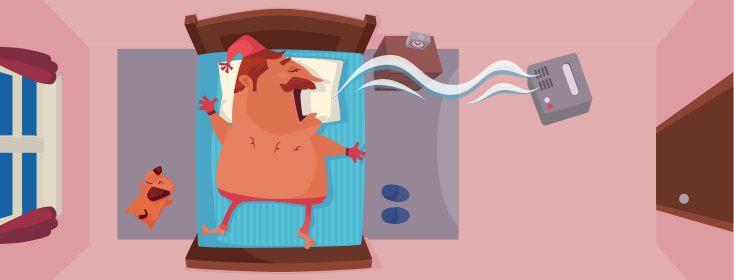Sleep Better with Psoriasis
Psoriasis can affect every aspect of life including the way you sleep. When my psoriasis was at it's worse, I remember waking up in the middle of the night to what I like to call "scratch sessions." For minutes at a time, I would lay on my back, kick my legs up to the sky and scratched until I saw blood. There were many times that the itching was so bad I couldn't sleep at night. A study published in the National Institutes of Health reported that up to 44% of people with psoriasis suffered from insomnia, which is the inability to sleep. Factors include irritability, itching, being uncomfortable, pain, and anxiety. In honor of National Sleep Week check out the following tips on getting a better night sleep with psoriasis. Be sure to consult with your doctor before using new remedies.
Sleep with a humidifier
If you have psoriasis you are well acquainted with dry skin, which means you need as much moisture as you can possibly get. Although lotions and oils will help, adding a humidifier to your room will help increase your ability to obtain and maintain moisture for your skin. This is especially important if you live in an area which has cold temperatures.
Wear cotton gloves
There were times through the night I would scratch in my sleep. The only indications of these "sessions" were the millions of flakes of dry skin, blood stains on the sheets, and broken skin. While scratch feels good, it's a temporary relief that could have big consequences like an infection of the skin. The remedy for this issue is to wear cotton gloves at night while you sleep. Although you may still attempt to scratch at night, the material on your hands will serve as a barrier between your nails and your body thus no breaking of the skin.
Use a heavy greasy moisturizer
I found that using a heavy greasy moisturizer during the day is a bit of an inconvenience because it leaves greasy residue on my clothes. I find that taking a lukewarm shower right before bedtime and then applying a heavy moisturizer works best, and combined with the humidifier you have double moisture for your skin.
Take Benadryl before bed
Taking a Benadryl at night can help you get a better night's sleep while keeping your itching at bay. I used this regimen as a teen growing up with psoriasis. Benadryl main component is an antihistamine called diphenhydramine, which can also help allergic reactions. For me the downside to this option was I was very groggy the next day. Others I know who have used this regimen usually choose to take half a pill or less.
Find a lotion with menthol
This choice may be useful for those with both psoriasis as well as those with psoriatic disease. Menthol is an analgesic which provides temporary pain relief. Those with psoriatic disease may suffer from joint pain, but if you don't have the arthritis component your skin may still hurt. If your skin is extremely dry, cracked, and flaky, using a lotion with menthol may temporarily soothe pain of the skin.

Join the conversation